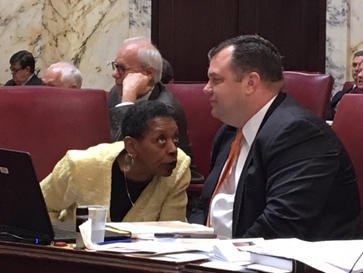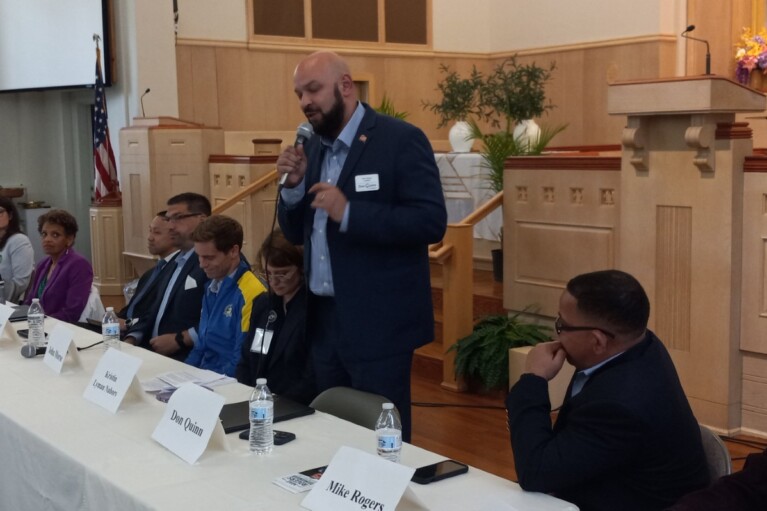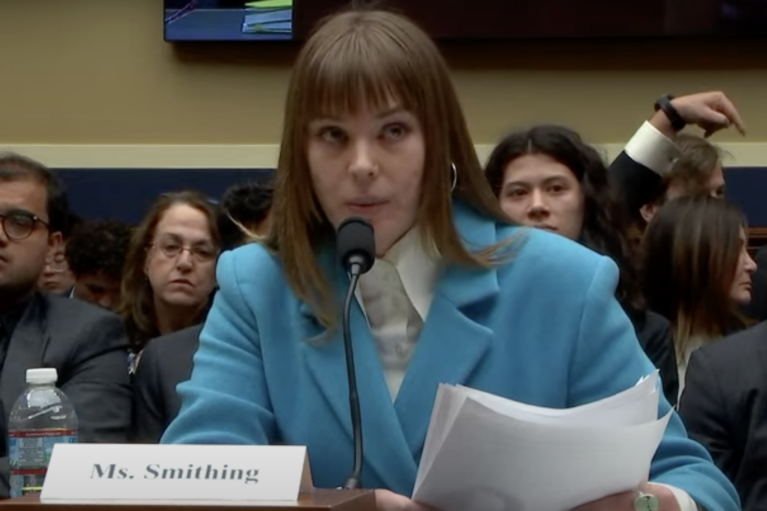Likely Hogan Veto Awaits Controversial School Construction Bill

Senate backers of a sharply contested measure to change Maryland’s school construction funding process thwarted a brief Republican filibuster on Thursday, approving the measure on a party-line vote.
The measure would remove the Board of Public Works — made up of the governor, comptroller and treasurer — from its current role in hearing funding appeals from local leaders. Instead, a revamped version of the Interagency Commission on School Construction, made up of nine members, four appointed by the governor and four by legislative leaders, would make decisions about which school projects get funded and in what order.
Under the current system, officials from the counties and Baltimore City whose requests are denied by the IAC can make their case before the board during the twice-annual “beg-a-thon.”
Democrats’ claimed that HB1783, based largely on the work of the 21st Century School Facilities Commission (known as the Knott Commission for its chairman, Martin G. Knott Jr.), represented a true advance in how taxpayer dollars are spent. Having none of it, Republicans slammed the proposal for nearly two hours, calling it unwise public policy, an unseemly assault on state Comptroller Peter V.R. Franchot (D), and a late-session rush job that eluded traditional legislative protocols.
“This is going to be, perhaps, the great mistake of this session,” said Sen. Stephen M. Waugh (R-St. Mary’s, Calvert).

After a tense exchange on the Senate floor Thursday, Minority Whip Stephen S. Hershey Jr., right, and President Thomas V. Mike Miller Jr. appear to reconcile, as Patrick H. Murray, Miller’s chief of staff, looks on. Photo by Bruce DePuyt
“You have elected people who are accountable to the voters [who] can speak up and really do something, and it gives citizens a last voice,” said Sen. Justin D. Ready (R-Carroll).
Several lawmakers recalled instances in which citizens whose pleas for new schools or modernization of older buildings were ignored at the local level but were able to find relief in Annapolis.
“For my constituents, the Board of Public Works has always been a last resort for the advocates,” said Sen. James Brochin (D-Baltimore County). “It’s allowed my advocates to invite the comptroller, to invite the lieutenant governor, to our schools, and shine attention on our schools that needed new air conditioning, that needed additions.”
Reports about buildings in the Baltimore area that lacked heating in winter and air condition in the summer have dominated the airwaves in the weeks leading up to this year’s legislative session.
After a brief Republican talkathon was quashed, Democrats rose to tout the bill’s merits.

Photo by Bruce DePuyt
“The entire bill is a revolutionary step forward for Maryland school construction [because] it brings in new ideas,” said Sen. William C. Ferguson IV (D-Baltimore City). “We can’t let the politics, we can’t let election cycles, we can’t let the issue of which constituents may have more influence over others, change what should be a merit-based, independent process.”
He said recent shortcomings about individual buildings are proof the system needs change.
“Where was BPW when I had to shovel snow out of my wife’s classroom because the window wouldn’t shut? Where was BPW when City Springs [Elementary School] teachers were doing fire checks around the school because the fire system was broken? The system has been broken.”
In an interview last week, Senate President Thomas V. Mike Miller Jr. (D-Calvert) called the beg-a-thon “an embarrassment to the state of Maryland,” and he derided the comptroller as a shape-shifting publicity seeker.
And although he joined with Republicans in voting against the reform measure, Brochin acknowledged the current process isn’t always pretty.
“I watched my schools superintendent for years, and advocates, go before the Board of Public Works… and I didn’t like the way they were treated,” he said. “It bothered me that people were not allowed to speak, that they were shut down, tactics [used by] this administration, to be honest with you, [and] with previous administrations, going all the way back to when William Donald Schaefer was governor.”
Critics also expressed concern that the new school construction funding panel wouldn’t be open to public input or live-stream its meetings. Ferguson offered reassurance that those conditions would be met.
As the filibuster gained steam, Sen. Michael Hough (R-Frederick) read a long statement that Franchot offered at Wednesday’s board meeting, during which he defended the BPW’s record of advocating for families and school communities.
Miller, a vocal Franchot critic, interrupted. “Did he waste the time of the Board of Public Works by reading that yesterday?”
“This is what I wanted to read into the record because quite frankly he said better than I could what this [bill] really was,” Hough responded.
“And you read it just like [Franchot chief of staff] Len Foxwell wrote it,” Miller fumed, to laughter in the chamber. “And you did a good job.”
‘You see any corruption here?’
In another tense exchange, Miller cut short Minority Whip Stephen S. Hershey Jr. (R-Queen Anne’s).
“What are we going to bring into this process? We’re going to bring into this process corruption,” Hershey said. “We know that that’s going to happen now. We’ve got people who are unaccountable to anybody.”
“Look around this room,” Miller interjected. “These are your colleagues. You see any corruption here?”
“No. Not with these people,” Hershey said.
“That’s a very loose word you keep using over and over again,” Miller protested. “You don’t mean to do it, but you denigrate the entire General Assembly and the legislative process when you keep using that word.”
“If you could use another word we’d appreciate it very much.”
Lost on no one in the chamber was the empty chair in the back row, at a desk that, hours earlier, belonged to Sen. Nathaniel T. Oaks, the Baltimore city Democrat who resigned abruptly on Wednesday evening. During the Senate schools debate, Oaks was in federal court, pleading guilty to corruption charges.
“May I say it’s ripe for corruption?” Hershey offered.
Acknowledging the elephant in the room, Miller said: “We didn’t take this up last night on third reader because I didn’t want anybody to say that we were using the vote of someone who perhaps shouldn’t be voting on the bill. That’s the reason the bill’s taken up today.”
Trying to get the train back on the track, Sen. Delores G. Kelley (D-Baltimore County) gamely moved the discussion back to the bill. “Sometimes,” the Annapolis veteran said, “the structure of the situation is simply not working.”
The measure, which Gov. Lawrence J. Hogan Jr. (R) has promised to veto the moment it reaches his desk, passed 29-14. The Democrats’ rush owed to a desire to get the bill to him in time to trigger a provision that Hogan act on it during the current legislative session. That would give lawmakers the opportunity to attempt an override before they adjourn April 9. It will take all 29 of those Democratic votes to do so.




 Creative Commons Attribution
Creative Commons Attribution